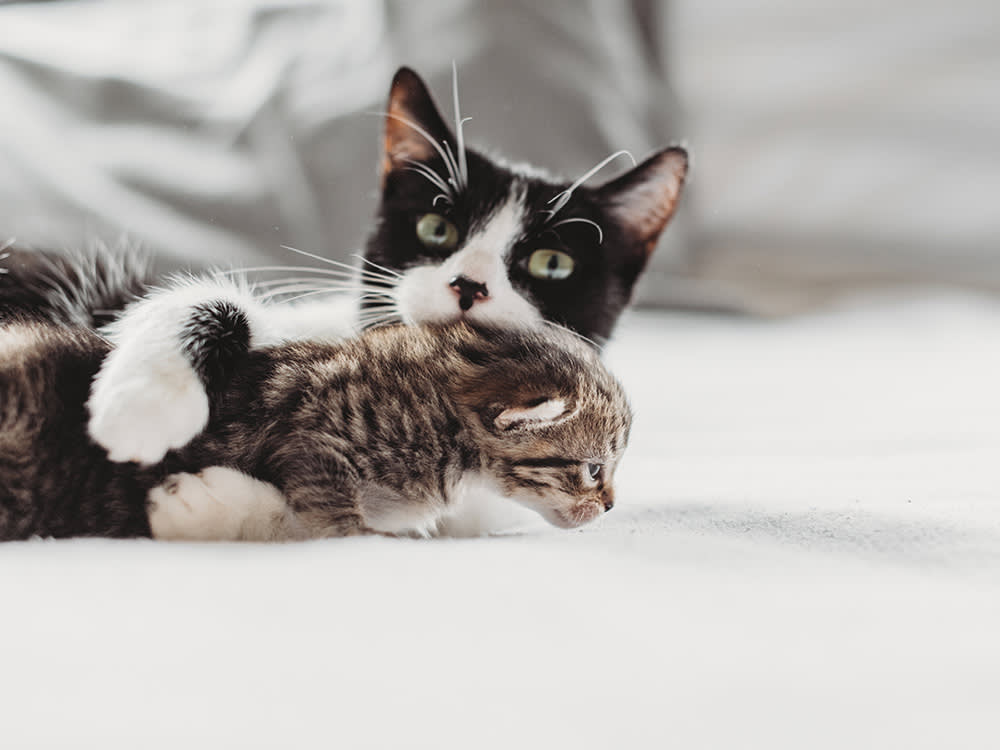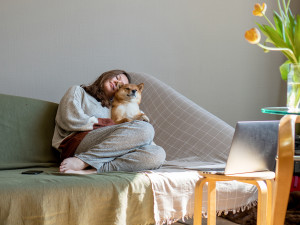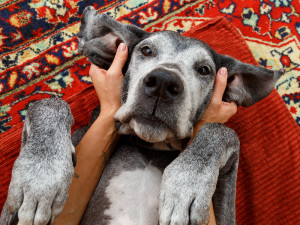Should I Adopt a Young or Adult Pet?
Age isn’t always just a number.

share article
If you’re looking to adopt a pet, it can be hard to ignore the incomparable cuteness of a puppy or kitten when deciding who to take home. But the process of figuring out which animal to adopt comes down to more than just losing yourself in that fresh puppy smell or tiny kitten beans — sometimes a grown-up pet might suit you and your lifestyle better. Plus, adults and senior pets often need homes more urgently than than puppies and kittens do. So, how do you tell which is right for you?
Adopt a puppy or kitten if:
You have the time and energy for training.
Probably the biggest and most intensive part of adopting a young animal is that you will need to be involved in their training. This is more of a thing with dogs than with cats (who hopefully will be at least litter box trained coming home), and a big part of your initial relationship with a young pet will be training them to be well-behaved members of your family. For dogs in particular, that means housebreaking; basic commands (sit, stay, heel); leash training; and socialization with other people and animals. For cats, when they’re young is the best time to train them to accept being handled by humans, especially in their sensitive spots like stomachs and feet, and in what types of play are appropriate so that they don’t think that mauling your hand is good fun.
You don’t mind cleaning.
Let’s be honest: You’re going to be cleaning up after your pet a lot over the years, and it starts at full speed with a puppy or kitten. Even if you’re well on your way to a housebroken or litter-trained animal, sometimes a small critter just can’t make it to where they need to do their business in time. Combine that with younger animals often having more sensitive stomachs (which can mean the occasional vomitopens in a new tab or diarrheaopens in a new tab cleanup) and you should be prepared with a stash of cleaning supplies on hand. Luckily this (usually) settles down over time.
You’re at home more often.
Young animals need more consistent care and attention. Especially if you’re fostering baby animals, but even for the first year or two of life, a puppy or kitten needs to be around people frequently. Part of this is just managing their needs so that a puppy can be taken out as often as they need to go to the bathroom, but part of it is also socialization and enrichment. The more time they spend playing with people as young animals, the more comfortable they are around people as grown pets — and a tired and well-entertained animal is less destructive than a bored one. As Dilara Göksel Parry, certified cat behavior consultant at Feline Mindsopens in a new tab and Cat Town Oakland’s Program Manageropens in a new tab explains, kittens are “go, go, go nonstop play,” and they need a commensurate level of attention.
You want to get ahead of vet fees.
Pet insuranceopens in a new tab is an important investment in the wellbeing of your animal. It can mean the difference between spending tens of thousands on an important procedure or just a couple of hundred on a deductible. Getting your pet on pet insurance when they’re young means you can get them in the system before they get penalized for “pre-existing conditions” and make sure they’re covered from the start.
You don’t mind bite marks.
Teething means chewed-up shoes, power cables, table legs, toes…doesn’t matter if it’s a cat or a dog; those tiny needle teeth are going to be gnawing on something, no matter how many chew toys you put in front of them. Do your best to manage it with bitter spray, but also be aware that it’s mostly unavoidable.
Adopt an adult animal if:
You want a (mostly) trained animal.
Most adult animals will come to you with at least some level of training. Dogs will probably be housebroken (and might know some basic commands) and cats will be litter-box trained. There will be some outliers in this regard, but chances are you can rely on them knowing the basics. You may end up wanting to augment their training further, but having an animal who knows when they need to be let out is a huge help.
You want an animal with a known personality.
As Parry explains, if you want an animal who’s going to match a certain type of behavior, go with an older one. “The most common behavior adopters want is lap cat. If you want a lap cat, get an adult who’s already demonstrating that behavior for you,” she says. “A lot of people think ‘I can mold the kitten the way I want’ — they think this about puppies, too. And that’s just actually not really what happens. We can certainly encourage them to do behaviors we like and we can train them. But temperament-wise, there’s so much there we’re not in control of.”
You want to skip the fees.
In order to help adults go to loving homes, many adoption agencies will lower or waive the fees associated with older animals. This can often mean hundreds of dollars in savings from the get-go for an animal who is already microchipped, spayed or neutered, and up to date on all their shots. In the grand scheme of the life of a pet, this may not end up being a huge difference, but when you’re first getting your home set up with everything you need, it’s pretty significant.
You want to support animals who might not be able to find a home.
It’s harder to find homes that are willing to take adult (and even more so senior) pets. They can end up in adoption centers for any number of reasons, but they deserve a loving home just as much as any puppy or kitten. If you want to help an animal who may otherwise be passed over for adoption, bringing home an adult animal is definitely a way to do so. And they’ll provide you with just as much companionship and love as a baby.
You work longer hours.
Adult animals don’t need the frequent hands-on care the way that extremely young ones do. Adult cats are generally fine left to their own devices during an entire workday (they’ll probably just find a warm spot and sleep until late afternoon anyway), and an adult dog may only need to be briefly let out or walked during the course of a day. If you already have a schedule that you want to try and stick to, an adult animal may be the way to go.
You want a quieter household.
Pets tend to mellow out as they age. Where a puppy or a kitten might tear around the house at all hours, hurling themselves at anything they think will give them even a moment’s entertainment, an adult pet will probably be a lot happier to just flop in a comfy spot for much of the day. That’s not to say that a grown cat won’t decide at 3am to have a bad case of the zoomies, or that your adult dog won’t bark its head off at a squirrel that goes past the window — quieter isn’t the same as quiet.
Adopting a pet is one of the most rewarding things you can do and brings so much enrichment to a household. Deciding between taking home a puppy or a kitten vs an adult is a big decision and can significantly change your day-to-day care of the animal. One isn’t better than the other; they just need different things and suit different people — so be sure to weigh your potential pet’s needs to figure out which makes the most sense for you.

Tim Barribeau
Tim Barribeau is a freelance writer, editor, cat dad, and “help your boyfriend buy a suit that actually fits for once” consultant. He was previously the Style and Pets editor at Wirecutter, and has bylines at a bunch of publications that don't exist anymore (and a couple that still do).
Related articles
![Happy Labrador Retriever sitting on the floor]() opens in a new tab
opens in a new tabDid You Know 25% of Shelter Dogs Are Purebred?
If your heart is set on a purebred pup, start your search at breed-specific rescue organizations.
![shiba inu snuggling on couch with woman]() opens in a new tab
opens in a new tabMoney Talks: The Dollars of Dog Parenthood
We crunched some numbers and yup, they’re worth every penny.
![Dog standing in an animal shelter]() opens in a new tab
opens in a new tab“Should I Adopt an Adult Rescue Dog?”
Yes! Shelters are full of good, grown-up doggos. Here’s how to find the perfect match.
![Crop Owner Caressing Dog On Floor]() opens in a new tab
opens in a new tabHow to Train and Communicate with a Deaf Dog
But first, how to spot the early signs of hearing loss.



